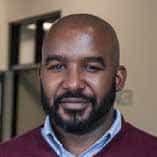When we read the book of Joshua, we typically focus on the physical land that the characters in the book are seeking to inhabit. Although I think possessing the land was important, I do not think that it was the only focus of the book of Joshua. Primarily, I understand the book to be about God’s relationship with God’s people and God’s attempts to help them live into what that relationship should look like.
 Terrell CarterI think we also learn through the book that God thinks openly and creatively as it relates to who can be in relationship with God and whom God chooses to use in the process of blessing God’s children. This is born out in Joshua 2.
Terrell CarterI think we also learn through the book that God thinks openly and creatively as it relates to who can be in relationship with God and whom God chooses to use in the process of blessing God’s children. This is born out in Joshua 2.
To prepare to enter and overtake the promised land, Joshua sent two spies over the river and into the city of Jericho to see what military resistance they would face. After entering the city, the spies connect with a woman who decides to help them by providing shelter and protection. She is not your run-of-the-mill good Samaritan. She is a prostitute. A woman who sells her body and sexual acts for money.
Some commentators, understandably trying to find a more respectable way of describing her, call her an innkeeper. But that is not who she was. She was someone who occupied the lowest rungs of society. She was not respected. She and her profession were tolerated. What she did was a necessary evil that existed on the fringes of society, literally and figuratively.
In the end, Rahab provided the Hebrew spies with protection, shelter and a safe getaway from the land of Jericho.
But Rahab’s story does not end in Joshua 2. The Bible tells us that she became an important person in their history. Her significance is reflected in the fact that she is identified by multiple New Testament writers as an example of the kind of person who showed faith that pleased God.
If we take scripture seriously, this should cause us to potentially ask a few questions about how God views people whom we think of as second-class citizens. Does membership in God’s family require a person to have a specific background, or pedigree or lifestyle to be considered faithful to God or to be able to be used by God? Rahab serves less as an example of the type of people we should avoid and cast aside and instead serves as an example of the type of people we should be willing to welcome into God’s family.
God saw fit to use an unlikely person to contribute to Israel’s success in entering the Promised Land, and that person eventually played a role in the lineage of Jesus, our Savior. Are we willing to see other people as potential Rahabs today?
Who are the people whose mere presence causes us to become uncomfortable? Who are the people that we look down upon or become suspicious of? In our society, we think we can read a person and their life story within a few minutes. We think we have them figured out simply by who they voted for, where they grew up, where they live or who they date or love. In doing that, we may be missing out on the story that God is writing, or rewriting, for them and us.
Ultimately, God is looking for people who will come as they are and participate as they are. As we, like the Israelites, are following God’s guidance on our journey to the Promised Land (whatever that may look like), will we put prerequisites on people before they can be fully accepted into God’s family? Will we say and act as if they must reach a level we predetermine before God can accept them or use them?
One of the questions we face as we seek to move forward on our journey to the Promised Land is, will we be able to recognize and accept God’s agents of change if they do not look like we expect? Paraphrasing Dr. Martin Luther King Jr., I pray that we would judge people according to the content of their character and not the superficial criteria that usually clouds our judgment. Amen.
Terrell Carter is assistant professor and director of contextualized learning at Central Baptist Theological Seminary in Shawnee, Kan., and pastor of Webster Groves Baptist Church in Mo.

